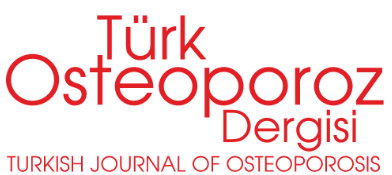ÖZET
Amaç:
Osteoporoz, kemik mineral yoğunluğunun azalması ve kemik dokusunun mikro yapısının bozulması ile karakterize multifaktöriyel bir hastalıktır. Kemik kütlesini etkileyen çeşitli aday genlerin varlığı bildirilmiştir. Bu çalışmada PPAR-α geni intron 7 G>C (rs4253778) polimorfizmi ile osteoporoz arasındaki ilişkiyi incelemeyi amaçladık.
Gereç ve Yöntem:
Çalışmaya çoğunlukla Orta Karadeniz Bölgesi’nden 250 postmenopozal kadın (osteoporozlu 150 olgu ve 100 postmenopozal sağlıklı kontrol) dahil edildi. Hasta ve kontrol gruplarından periferik kan örnekleri alındı ve kit metodolojisi kullanılarak DNA izolasyonu yapıldı. Genotiplendirme polimeraz zincir reaksiyonu-kısıtlama parçası uzunluk polimorfizmi yöntemi ile gerçekleştirildi. İstatistiksel analiz için Statistical Package for the Social Sciences 20 programı ve ki-kare analizi yapıldı.
Bulgular:
Çalışma sonucunda genotip dağılımı ile osteoporoz arasında istatistiksel olarak anlamlı bir ilişki bulunmazken, C allel sıklığı hasta grubunda daha yüksekti ve istatistiksel olarak anlamlıydı (p=0,017).
Sonuç:
Bildiğimiz kadarıyla bu, Türkiye’de Orta Karadeniz Bölgesi’nde yapılan ilk çalışmadır. Çalışma popülasyonunun genişletilmesi ve sonuçların birleştirilmesiyle polimorfik bölgelerin osteoporoza duyarlılığı ile ilgili daha açıklayıcı sonuçlar elde edilebilir.



